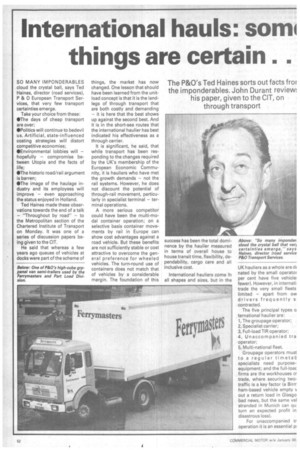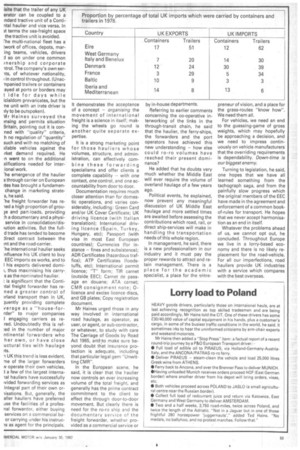International hauls: soml things are certain . .
Page 50

Page 51

If you've noticed an error in this article please click here to report it so we can fix it.
The P&O's Ted Haines sorts out facts fror the imponderables. John Durant review: his paper, given to the CIT, on through transport
SO MANY IMPONDERABLES cloud the crystal ball, says Ted Haines, director {road services), P & 0 European Transport Services, that very few transport certainties emerge.
Take your choice from these: *The days of cheap transport are over; *Politics will continue to bedevil us. Artificial, state-influenced costing strategies will distort competitive economies; SEnvironmental lobbies will — hopefully — compromise between Utopia and the facts of life; *The historic road/rail argument is barren; 4/The image of the haulage industry and its employees will improve — even approaching the status enjoyed in Holland.
Ted Haines made these observations towards the end of a talk — "Throughout by road" — to the Metropolitan section of the Chartered Institute of Transport on Monday. It was one of a series of discussion papers being given to the CIT.
He said that whereas a few years ago queues of vehicles at docks were part of the scheme of things, the market has now changed. One lesson that should have been learned from the unitload concept is that it is the landlegs of through transport that are both costly and demanding — it is here that the best shows up against the second best. And it is in the short-sea routes that the international haulier has best indicated his effectiveness as a through carrier.
It is significant, he said, that while transport has been responding to the changes required by the UK's membership of the European Economic Community, it is hauliers who have met the growth demands — not the rail systems. However, he does not discount the potential of through-rail movement, particularly in specialist terminal — terminal operations.
A more serious competitor could have been the multi-modal container operation; on a selective basis container movements by rail in Europe can show cost advantages against a road vehicle. But these benefits are not sufficiently stable or cost attractive to overcome the general preference for wheeled vehicles. The turn-round use of containers does not match that of vehicles by a considerable margin. The foundation of this
success has been the total dominence by the haulier measured in terms of overall house to house transit time, flexibility, dependability, cargo care and all inclusive cost.
International hauliers come in all shapes and sizes, but in the UK hauliers as a whole are dr nated by the small operator per cent have five vehicle: fewer). However, in internati: trade the very small fleets limited — apart from ow drivers frequently s contracted.
The five principal types o ternational haulier are: 1, The groupage operator; 2, Specialist carrier; 3, Full-load TIR operator; 4, Unaccompanied tra operator; 5, Multi-national fleet.
Groupage operators must to a regular timetab specialists need purposeequipment; and the full-loac firms are the workhouses 01 trade, where securing twotraffic is a key factor {a Birrr ham-based vehicle empty out a return load in Glasgo bad news, but the same vel stranded in Munich can qu turn an expected profit in disastrous loss).
For unaccompanied tr operation it is an essential p:
isite that the trailer of any UK erator can be coupled to a indard tractive unit of a ContiMal haulier and vice versa. In 3t terms the sea-freight space the tractive unit is avoided. rhe multi-national fleet has a twork of offices, depots, mar:ing teams, vehicles, drivers J so on under one common rnership and corporate -Aro!. The company's own serIts, of whatever nationality, in control throughout. (Unacmpanied trailers or containers layed at ports or borders may t idle for days while icialdom prevaricates, but the ne unit with an irate driver is :ly to be outspoken).
VIIHaines surveyed the :nsing and permits situation Britain, pointing out it is con.ned with "quality" criteria, h no regulation of "quantity" such and with no matching of :liable vehicles against the irket demand required. He !n went to on the additional 3Iifications needed for inter:lona! work.
he emergence of the haulier a through carrier on European rtes has brought a fundamenchange in marketing strates, he said.
he freight forwarder has reied a high proportion of group and part-loads, providing a documentary and a physiservice in consolidation/disnation activities. But the fulld trade has tended to become direct contract between the ?nt and the road-carrier.
he international haulier seeks influence his UK client to buy EEC imports ex works, and to I his exports delivered domi1, thus maximising his carry-.
s as the nominated haulier.
t is significant that the Confinel freight forwarder has rened a greater control of ?rland transport than in UK, luently providing complete verage as a "house-forrder" to major companies I engaging carriers as rered. Undoubtedly this is refted in the number of major ntinental forwarders who her own, or have close uctural ties with haulage As.
UK this trend is less evident. me of the larger forwarders AI operate their own vehicles, I a few of the largest interna ial have successfully ivided forwarding services as integral part of their own orlisations. But, generally, the aller hauliers have preferred use the facilities of a profes
nal forwarder, either buying services on a commercial baor carrying under his instrucis as agent for the principals. t demonstrates the acceptance of a concept — organising the movement of international freight is a science in itself; making the wheels go round is another quite separate expertise.
It is a strong marketing point for those hauliers whose volumes, structure, and administration, can effectively combine these forwarding specialisms and offer clients a complete capability — with one contact, one control, and one accountability from door to door.
Documentation requires much closer attention than for domestic operations, and varies considerably, including: Green Card and/or UK Cover Certificate; UK driving licence (with Italian translation); International driving licence (Spain, Turkey, Hungary, etc); Passport (with visa in most East European countries); Currencies (for instance — fines and subsistence); ADR Certificates (hazardous traffics); ATP Certificates (foodstuffs, etc); International permit licence; "T" form; TIR carnet (outside EEC); Carnet de passage en douane; ATA carnet; CM R consignment note; 0licence and excise licence discs, and GB plates; Copy registration document.
Mr Haines urged those in any way involved in international road haulage, as operator, as user, or agent, or sub-contractor, or whatever, to study with care The Ca-rriage of Goods by Road Act 1965, aritt.:to make sure beyond doubt that insurance protection is adequate, including that particular legal gem "Unwitting CMR".
In the European scene, he said, it is clear that the haulier now controls an ever increasing volume of the total freight, and generally has the prime contract commitment to the client to effect the through door-to-door movement. But clearly there is need for the ro-ro ship and the documentary service of the freight forwarder, whether provided as a commercial service or by in-house departments.
Referring to earlier comments concerning the co-operative interworking of the links in the through-transit chain, he said that the haulier, the ferry-ships, the forwarders and the port operators have achieved this new understanding — how else could ro-ro volumes have reached their present dominance?
He added that he doubts very much whether the Middle East will ever require the volume of overland haulage of a few years ago.
Political events, he explained, now prevent any meaningful discussion of UK Middle East haulage and more settled times are awaited before assessing the contributions which road, rail, or direct ship-services will make in handling the transportation needs of this whole region.
In management, he said, there is a new professionalism in our industry and it must pay the proper rewards to attract and retain management. There is a place for the academic specialist, a place for the entre preneur of vision, and a place for the grass-routes "know how". We need them all.
For vehicles, we need an end to the guessing-game of gross weights, which may hopefully be approaching a decision, and we need to impress continuously on vehicle manufacturers that the overriding requirements is dependability. Down-time is our biggest enemy.
Turning to legislation, he said, one hopes that we have all learned something from the tachograph saga, and from the painfully slow progress which the original members of the EEC have made in the agreement and enforcement of a common bookof-rules for transport. He hopes that we never accept harmonisation as an end in itself.
Whatever the problems ahead of us, we cannot opt out, he concluded. Throughout Europe we live in a lorry-based economy and there is no likely replacement for the road-vehicle. For all our imperfections, road hauliers provide UK industries with a service which compares with the best overseas.
























































